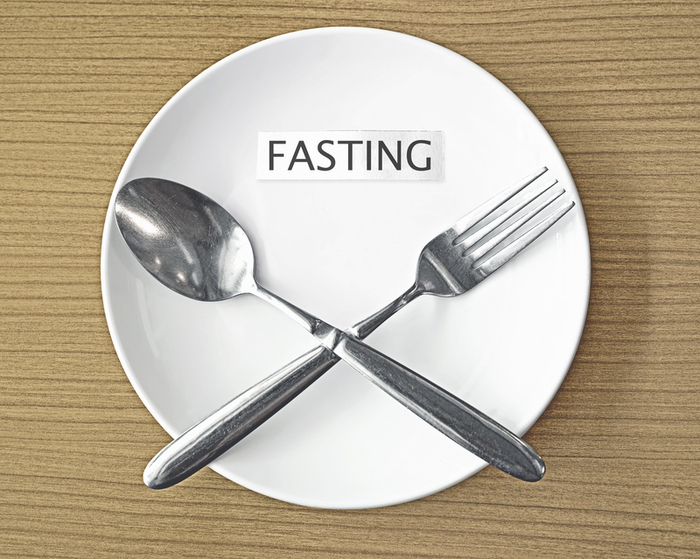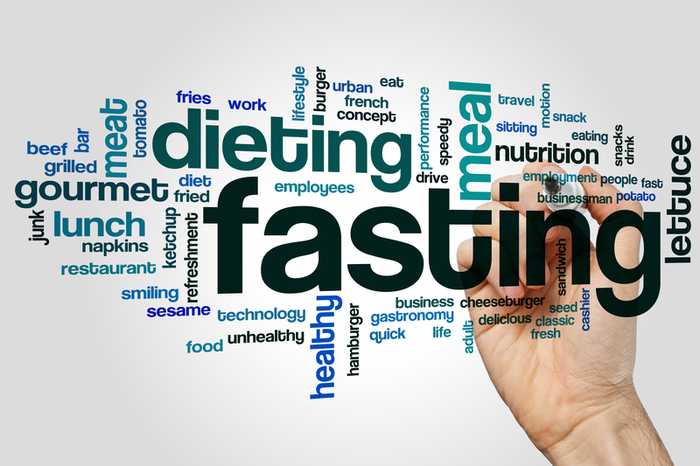- Calls to this hotline are currently being directed to Within Health, Fay or Eating Disorder Solutions
- Representatives are standing by 24/7 to help answer your questions
- All calls are confidential and HIPAA compliant
- There is no obligation or cost to call
- Eating Disorder Hope does not receive any commissions or fees dependent upon which provider you select
- Additional treatment providers are located on our directory or samhsa.gov
The Dangers of Fasting
Fasting is defined as abstaining from some or all kinds of food and beverage. In other words, the idea is to promote restricting food and beverage based on a time schedule.
Often society will promote a fad diet such as this as gaining control. For some this may do the exact opposite, leading to increased hunger and potentially binge eating episodes.
Perceived control or willpower is actually restriction and ignoring the body’s internal cues. Fasting in general is similar to any other diet, but the structure or times of restriction are altered.
Media Frenzy
A single search for intermittent fasting on the internet promotes only the benefits of the diet. You will find websites and books supporting the beginners guide to fasting, how it works, and what the benefits are.
What about the potential dangers of fasting? Do the websites and books show two sides of the research? Does that research support fasting as a healthy lifestyle? Or are there unknowns regarding this diet that an answer have yet to be found?
Types of Fasting
There are several types of fasting. Some based on diet or health promotion and others for religious reasoning. Here are a few types of fasting [3]:
- Complete Alternate Day Fasting – involves alternating fasting days with eating days
- Modified Fasting Regimens – two severe restriction days in a week and 5 days of eating as much or as often as desired
- Time-Restricted Feeding – fasting periods daily and promotes eating as much or as often as desired when not fasting
- Religious Fasting – fasting for religious or spiritual purposes
Each of these types of fasting have limited research to support their suggested benefits. The danger seen here is how eerily similar fasting is to disordered eating patterns.

Mirroring Disordered Eating Behaviors
Fasting seems to replicate the cycle of restriction and binge eating. Fasting promotes eating for weight loss and further disconnects mind from body. For some this can lead into a cycle of overeating.
Overeating Cycle [2]:
- Why – the trigger behind why you eat
- When – external or emotional cues that determine when you eat
- What – tempting or comfort foods
- How – mindlessly, quickly, or secretly
- How Much – until food is gone or I’m uncomfortable
- Where – excess fuel from a binge eating episode is stored in the body
This cycle cannot be cured by a diet but requires deeper internal work. The incorporation of cognitive behavioral therapy (CBT) for eating disorders can lead to healing and understanding the binge eating cycle [1].
Fasting may promote delayed eating and the adoption of rigid food rules that may only fuel disordered eating patterns [1]. In addition, fasting may not be practical due to intense hunger on fasting days [3].
Studies show that patients who consistently ate 3 meals per day had fewer binge eating episodes than those who didn’t eat 3 meals per day [1].
Research also shows that dieting predicts future weight gain and is a risk factor in the development of eating disorders.
Fasting, What Does the Research Say?
Human research studies related to fasting are limited. But the ones that are out there do not have enough evidence to support long-term benefits of intermittent fasting.
Does research show that, in the short term, fasting may lead to weight loss? Yes, but most people who diet will lose weight and then gain back the weight and then some.
Short term weight loss doesn’t show health benefits long-term. Yo-yo dieting actually harms all body systems and negatively impacts the metabolism.
Most studies didn’t compare the long-term effects of intermittent fasting with the harmful effects of continuous energy restriction. This again is because majority of studies were short-term, showing the benefits of only short-term fasting diets.
It is well known that continuous restriction leads to malnutrition and impacts all body systems, slowing the metabolic rate as a form of survival.
Data is not there to support fasting as a positive impact on health behaviors including diet, sleep, and physical activity [3]. Data related to human health and fasting is overall insufficient.

What is Recommended then?
There is limited evidence supporting intermittent fasting as an optimal diet over healthy and regular eating patterns [1]. Overall lifestyle changes including small, gradual changes can lead to lasting benefits.
There is evidence that delayed eating increases the risk of overeating and binge eating episodes [1]. Rather than just stating here that fasting is not feasible or sustainable, what about approaching what is sustainable?
Studies have shown that to maintain optimal metabolic function consistent food intake as well as normal daily circadian rhythms are recommended [3]. This means sleeping at night and eating during the day.
Wait, does that mean we are fasting over night? Yes, overnight the body is in a fasting state to allow for healing and regeneration.
There is substantial research supporting the negative impacts of shift work and the disruption of circadian rhythm. This disruption may be associated with health complications long-term [3].
A sustainable approach may involve seeking support surrounding regular and consistent eating habits. For example, including 3 meals per day and 2 snacks may be more aligned with the body’s biological cues.
A dietitian can help support building sustainable eating patterns that rely on listening to the body rather than controlling it.
Resources:
[1] Dalle Grave, R. (2020). Regular eating, not intermittent fasting, is the best strategy for a healthy eating control. IJEDO, 2, 5–7. https://doi.org/10.32044/ijedo.2020.02 [2] May, M., MD. (2020). Eat What You Love, Love What You Eat: A Mindful Eating Program to Break Your Eat-Repent-Repeat Cycle (Updated 2020 ed.). Am I Hungry? Publishing. [3] Patterson, PhD, R. E., Laughlin, PhD, G. A., & Sears, PhD, D. D. (2012). INTERMITTENT FASTING AND HUMAN METABOLIC HEALTH. Journal of the Academy of Nutrition and Dietetics, 115(8), 1203–1212.Author: Raylene Hungate, RDN,LD/N
Page Last Reviewed and Approved on March 09, 2022 By: Jacquelyn Ekern, MS, LPC

